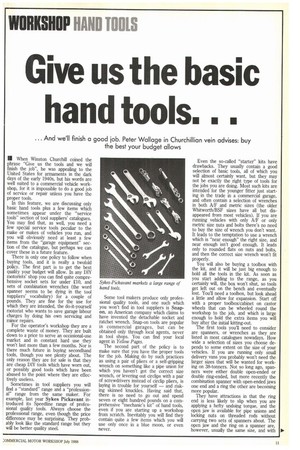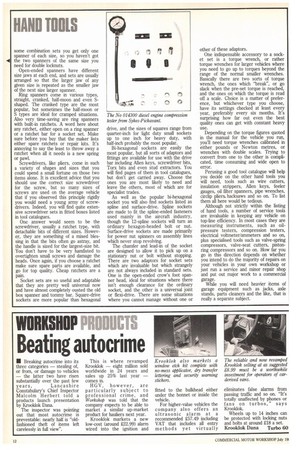Give us the basic hand tools. . .
Page 117

Page 118

If you've noticed an error in this article please click here to report it so we can fix it.
... And we'll finish a good job. Peter Wallage in Churchillian vein advises: buy the best your budget allows
• When Winston Churchill coined the phrase "Give us the tools and we will finish the job", he was appealing to the United States for armaments in the dark days of the early 1940s, but his words are well suited to a commercial vehicle workshop, for it is impossible to do a good job of service or repair unless you have the proper tools.
In this feature, we are discussing only basic hand tools plus a few items which sometimes appear under the "service tools" section of tool suppliers' catalogues. You may find that, as well, you need a few special service tools peculiar to the make or makes of vehicles you run, and you will obviously need at least a few items from the "garage equipment" section of the catalogue, but perhaps we can cover these in a future feature.
There is only one policy to follow when buying tools, and it is really a twofold policy. The first part is to get the best quality your budget will allow. In any DIY motorists' shop you can find quite comprehensive socket sets for under £10, and sets of combination wrenches (the word spanner seems to be dying in the tool suppliers' vocabulary) for a couple of pounds. They are fine for the use for which they are intended, the do-it-yourself motorist who wants to save garage labour charges by doing his own servicing and minor repairs.
For the operator's workshop they are a complete waste of money. They are built down to a price to serve an occasional-use market and in constant hard use they won't last more than a few months. Nor is there much future in buying secondhand tools, though you see plenty about The only reason they are for sale is that they are cheap DIY tools which have worn out, or possibly good tools which have been abused to the point where they are effectively useless.
Sometimes in tool suppliers you will find a "standard" range and a "professional" range from the same maker. For example, last year Sykes Pickavant introduced its Speedline range of professional quality tools. Always choose the professional range, even though the price difference may be surprising. They probably look like the standard range but they will be better quality steel. Some tool makers produce only professional quality tools, and one such which you won't find in tool suppliers is Snapon, an American company which claims to have invented the detachable socket and ratchet wrench. Snap-on tools are popular in commercial garages, but can be obtained only through local agents, never in tool shops. You can find your local agent in Yellow Pages.
The second part of the policy is to make sure that you have the proper tools for the job. Making do by such practices as using a pair of pliers or a self-gripping wrench on something like a pipe union for which you haven't got the correct size wrench, or levering out circlips with a pair of screwdrivers instead of circlip pliers, is laying in trouble for yourself — and risking skinned knuckles. Having said that, there is no need to go out and spend seven or eight hundred pounds on a comprehensive "mechanic's kit" of hand tools, even if you are starting up a workshop from scratch. Inevitably you will find they contain quite a few items which you will use only once in a blue moon, or even never. Even the so-called "starter" kits have drawbacks. They usually contain a good selection of basic tools, all of which you will almost certainly want, but they may not be exactly the right type of tools for the jobs you are doing. Most such kits are intended for the younger fitter just starting in the trade in a commercial garage, and often contain a selection of wrenches in both A/F and metric sizes (the older Whitworth/BSF sizes have all but disappeared from most vehicles). If you are running vehicles with only A/F or only metric size nuts and bolts there's no need to buy the size of wrench you don't want. It leads to the temptation to use a wrench which is "near enough" the right size, and near enough isn't good enough. It leads only to rounded flats on nuts and bolts, and then the correct size wrench won't fit properly.
You will also be buying a toolbox with the kit, and it will be just big enough to hold all the tools in the kit. As soon as you start adding to the range, as you certainly will, the box won't shut, so tools get left out on the bench and eventually lost. You'll need a toolbox, but look ahead a little and allow for expansion. Start off with a proper toolbox/cabinet on castor wheels that can be wheeled round the workshop to the job, and which is large enough to hold the extra items you will buy after the initial kitting-out.
The first tools you'll need to consider are spanners, or wrenches as they are listed in most catalogues nowadays. How wide a selection of sizes you choose depends to some extent on the size of your vehicles. If you are running only small delivery vans you probably won't need the larger sizes that will be wanted for working on 38-tonners. Not so long ago, spanners were either double open-ended or double ring-ended, but more recently the combination spanner with open-ended jaws one end and a ring the other are becoming more popular.
They have attractions in that the ring end is less likely to slip when you are applying a hefty undoing torque, and the open jaw is available for pipe unions and locking nuts on threaded rods without carrying two sets of spanners about The open jaw and the ring on a spanner are, however, usually the same size, and with some combination sets you get only one spanner of each size, so you haven't got the two spanners of the same size you need for double locknuts.
Open-ended spanners have different size jaws at each end, and sets are usually arranged so that the larger jaw of any given size is repeated as the smaller jaw of the next size larger spanner. Ring spanners come in various types, straight, cranked, half-moon and even Sshaped. The cranked type are the most popular, but sometimes the half-moon or S types are ideal for cramped situations. Also very time-saving are ring spanners with built-in ratchets. A word here about any ratchet, either open on a ring spanner or a ratchet bar for a socket set. Make sure before you buy that the maker lists either spare ratchets or repair kits. It's annoying to say the least to throw away a ratchet when all it needs is a new spring or pawl.
Screwdrivers, like pliers, come in such a variety of shapes and sizes that you could spend a small fortune on those two items alone. It is excellent advice that you should use the correct size screwdriver for the screw, but so many sizes of screws are used on the average vehicle that if you observed this principle rigidly you would need a young army of screwdrivers. Indeed, you will find quite extensive screwdriver sets in fitted boxes listed in tool catalogues.
One answer would seem to be the screwdriver, usually a ratchet type, with detachable bits of different sizes. Howev er, they are something of a mixed blessing in that the bits often go astray, and the handle is sized for the largest-size bit.
You don't have to be very hamfisted to overtighten small screws and damage the heads. Once again, if you choose a ratchet make sure spare parts are available, and go for top quality. Cheap ratchets are a pthm Socket sets are so useful and adaptable that they are pretty well universal now and have almost completely ousted the old box spanner and tommy bar. Square-drive sockets are more popular than hexagonal drive, and the sizes of squares range from quarter-inch for light duty small sockets up to one inch for heavy duty, with half-inch probably the most popular.
Bi-hexagonal sockets are easily the most popular, but all sorts of adaptors and fittings are available for use with the drive bar including Allen keys, screwdriver bits, Toni bits and even stud extractors. You will find pages of them in tool catalogues, but don't get carried away. Choose the ones you are most likely to need and leave the others, most of which are for specialist trades.
As well as the popular bi-hexagonal socket you will also find sockets listed as spline and surface-drive. Spline sockets are made to fit the spline-ended fasteners used mainly in the aircraft industry, though the 12-spline sockets will turn an ordinary hexagon-headed bolt or nut. Surface-drive sockets are made primarily for power nut spinners on assembly Imes which never stop revolving. The chamfer and lead-in of the socket are designed to allow it to pick up on a stationary nut or bolt without stopping. There are two adaptors for socket sets which are invaluable but which strangely are not always included in standard sets. One is the open-ended crow's foot span ner head, ideal for situations where there isn't enough clearance for the ordinary socket, and the other is a universal joint or fleth-drive. There are some situations where you cannot manage without one or One indispensable accessory to a socket set is a torque wrench, or rather torque wrenches for larger vehicles where you need to go up to torques beyond the range of the normal smaller wrenches. Basically there are two sorts of torque wrench, the ones which "break", or go slack when the pre-set torque is reached, and the ones on which the torque is read off a scale. Choice is a matter of preference, but whichever type you choose, have its settings checked at least every year, preferably every six months. It's surprising how far out even the best quality ones can get with constant heavy use.
Depending on the torque figures quoted in the manual for the vehicle you run, you'll need torque wrenches calibrated in either pounds or Newton metres, or wrenches with double scales. Trying to convert from one to the other is complicated, time consuming and wide open to error.
Perusing a good tool catalogue will help you decide on the other hand tools you will need, tools such as wire cutters, insulation strippers, Allen keys, feeler gauges, oil filter spanners, pipe wrenches, circlip pliers, hacksaws and so on. To list them all here would be tedious.
Although not strictly within the listing of hand tools, a number of service tools are invaluable in keeping any vehicle on top-line efficiency. In most cases they are measuring instruments, such as oil pressure testers, compression testers, electrical voltmeter/ammeters and so on, plus specialised tools such as valve-spring compressors, valve-seat cutters, piston ring compressors and so on. How far you go in this direction depends on whether you intend to do the majority of repairs on your vehicles in your own workshop or just run a service and minor repair shop and put out major work to a commercial garage.
While you will need heavier items of garage equipment such as jacks, axle stands, parts cleaners and the like, that is really a separate subject.
















































































































































